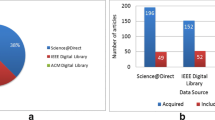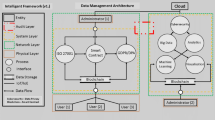Abstract
In the rapidly evolving landscape of blockchain consensus algorithms, existing methods encounter limitations in terms of security, time efficiency, and versatility. This research addresses these challenges through the proposal and implementation of a novel consensus algorithm designed to overcome the blockchain trilemma, ensuring a harmonious balance between decentralization, security, and scalability. Implemented as a federated Byzantine agreement system, this consensus incorporates the strengths of various consensus models, including Honey Badger BFT (HBFT), Proof of Authority (PoA), Stellar Consensus Protocol (SCP) and Practical Byzantine Fault Tolerance (PBFT). The algorithm integrates adaptive validation mechanisms to accommodate both private and public blockchain environments, enhancing its versatility. Through a comprehensive fault tolerance and identity management system, this consensus ensures robustness against malicious nodes, promoting a secure and reliable consensus process. The proposed consensus algorithm optimizes time efficiency by streamlining the consensus process, drawing inspiration from the nomination and ballot protocol of SCP. The analysis of outcomes shows how effective this consensus is at performing transactions with a throughput of 1627 transactions per second (TPS) and a latency of just 45 milliseconds, significantly reducing the required block time for securing 90.9% protection against double spending, maintaining a low fork probability of 10%, and achieving a decentralization measure of 8.094 out of 10.








Similar content being viewed by others
References
Akter N, Haque F, Reno S, Ahmed M (2022) Securing smart card management using hyperledger based private blockchain. In: 3rd International Conference for Emerging Technology (INCET). IEEE. pp 1–5
Alyaseen IFT et al (2019) Consensus algorithms blockchain: a comparative study. Int J Perceptive Cogn Comput 5(2):66–71
Barański S, Szymański J, Sobecki A, Gil D, Mora H (2020) Practical i-voting on stellar blockchain. Appl Sci 10(21):7606
Dao T-K, Nguyen T-D, Nguyen V-T et al (2023) An improved honey badger algorithm for coverage optimization in wireless sensor network. J Internet Technol 24(2):363–377
Ferdous MS, Chowdhury MJM, Hoque MA (2021) A survey of consensus algorithms in public blockchain systems for crypto-currencies. J Netw Comput Appl 182:103035
Gao S, Yu T, Zhu J, Cai W (2019) T-pbft: an eigentrust-based practical byzantine fault tolerance consensus algorithm. China Commun 16(12):111–123
Kim M, Kwon Y, Kim Y (2019) Is stellar as secure as you think? In: IEEE European Symposium on Security and Privacy Workshops (EuroS &PW). IEEE. pp 377–385
Manolache MA, Manolache S, Tapus N (2022) Decision making using the blockchain proof of authority consensus. Procedia Comput Sci 199:580–588
Mazieres D (2015) The stellar consensus protocol: a federated model for internet-level consensus. Stellar Dev Found 32:1–45
Miller A, Xia Y, Croman K, Shi E, Song D (2016) The honey badger of bft protocols. In: Proceedings of the 2016 ACM SIGSAC conference on computer and communications security, pp 31–42
Navaroj GI, Julie EG, Robinson YH (2022) Adaptive practical byzantine fault tolerance consensus algorithm in permission blockchain network. Int J Web Grid Serv 18(1):62–82
Nguyen G-T, Kim K (2018) A survey about consensus algorithms used in blockchain. J Inf Process Syst 14:1
Niloy SA, Ghosh I, Reno S, Rahman A, Rahaman S, Hossan MS (2023) Ensuring transparency, confidentiality, and deterrence of political influence in journalism using ipfs, private, public, and semi-public blockchains. Int J Inf Technol 16(2):1095–109
Pabitha P, Priya JC, Praveen R, Jagatheswari S (2023) Modchain: a hybridized secure and scaling blockchain framework for iot environment. Int J Inf Technol 15(3):1741–1754
Parinya Ekparinya P, Gramoli V, Jourjon G (1902) The attack of the clones against proof-of-authority
Quamara S, Singh AK (2022) Schain: towards the quest for redesigning supply-chain by augmenting blockchain for end-to-end management. Int J Inf Technol 14(5):2343–2354
Reno S, Haque MM (2022) “Utilizing off-chain storage protocol for solving the trilemma issue of blockchain. In: Emerging Technologies in Data Mining and Information Security: Proceedings of IEMIS 2022, vol. 3. minus. Springer, pp 169–179
Reno S, Priya SH, Al-Kafi G, Tasfia S, Turna MK (2024) A novel approach to optimizing transaction processing rate and space requirement of blockchain via off-chain architecture. Int J Inf Technol 16:2379–2394
Tiwari A, Batra U (2021) Ipfs enabled blockchain for smart cities. Int J Inf Technol 13(1):201–211
Toyoda K, Machi K, Ohtake Y, Zhang AN (2020) Function-level bottleneck analysis of private proof-of-authority ethereum blockchain. IEEE Access 8:141611–141621
Xu X, Zhu D, Yang X, Wang S, Qi L, Dou W (2021) Concurrent practical byzantine fault tolerance for integration of blockchain and supply chain. ACM Trans Internet Technol (TOIT) 21(1):1–17
Author information
Authors and Affiliations
Corresponding author
Ethics declarations
Conflict of interest
The authors declare that there is no Conflict of interest in relation to the presented research.
Data availability
The data that support the findings of this study are available from the corresponding author (Saha Reno) upon reasonable request (Email: reno.saha39@gmail.com).
Rights and permissions
Springer Nature or its licensor (e.g. a society or other partner) holds exclusive rights to this article under a publishing agreement with the author(s) or other rightsholder(s); author self-archiving of the accepted manuscript version of this article is solely governed by the terms of such publishing agreement and applicable law.
About this article
Cite this article
Al-Kafi, G.M.A., Ali, G., Faiza, J.T. et al. SHBF: a secure and scalable hybrid blockchain framework for resolving trilemma challenges. Int. j. inf. tecnol. (2024). https://doi.org/10.1007/s41870-024-01897-9
Received:
Accepted:
Published:
DOI: https://doi.org/10.1007/s41870-024-01897-9




